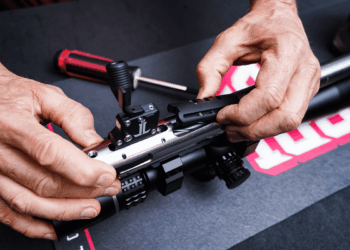Entrepreneurship offers a successful post-military career path for veterans, according to data from the U.S. Census Bureau.
A survey revealed one in 10 small businesses nationwide are veteran owned, with 45% of those who have active-duty military experience more likely to be self-employed than non-veterans.
Will Scott, vice president of business solutions at Navy Federal Credit Union, says veterans exploring this option should assess their financial strength.
“The first thing that I think they have to think about is their personal credit score,” Scott said. “Although there’s a misconception out there that you need business credit in order to get business loans or business financing, and the fact is — unless you’re a larger corporation — most financial institutions, including Navy Federal, are going to put a lot of weight on your personal credit score.”
He added that “680 is usually the minimum [score], but sometimes you can go down to 660 if you qualify for SBA loans.”
Savings, he says, is another significant asset for aspiring entrepreneurs.
“The second point is I would start to save some money for the business,” Scott said. “Typically in starting a business you’re going to have to demonstrate not only good credit but some financial strength — whether or not the business owner wants to borrow money or they’re going to bootstrap themselves. Ideally, the financial institutions would rather lend to those who have been in business for at least two years and have a track record of generating revenue and have some money in savings.”
Resources for veteran entrepreneurs

Scott, who has a graduate degree in banking from Stonier College at The Wharton School, brings more than two decades of business solutions expertise to his position. He also has strong family ties to the Army. He recommends those with a military affiliation explore programs at the Small Business Administration (SBA).
SBA offers a range of support for active duty and veteran entrepreneurs, including funding assistance, training and counseling, and federal contracting opportunities. Navy Federal Credit Union partners with the agency to support small businesses.
“They have a program called Boots to Business (B2B) training — and that’s a two-day, in-person introduction to entrepreneurship — focused specifically on military members and their spouses. They also have specific veteran outreach centers,” Scott said.
Veterans Business Outreach Centers (VBOC) exist across the U.S. to assist veterans in starting or growing a business. Local offices can be found on the SBA website.
The VBOC program offers:
- Transition assistance programs;
- Pre-business plan workshops;
- Business plan preparation;
- Entrepreneurial training;
- Mentorship.
Scott adds that the SCORE Foundation, a nonprofit organization that has helped 11 million entrepreneurs since 1964, has a network of 10,000 mentors available to work with service members and veterans through the Veteran Fast Launch Initiative.
“The SCORE Foundation is basically retired businessmen who volunteer their time to help new entrepreneurs,” he said.
Franchise versus startup

For those seeking a business model with an established foundation, a franchise may be an option. The International Franchise Association defines this structure as “a method of distributing products or services involving a franchisor, who establishes the brand’s trademark or trade name and a business system, and a franchisee, who pays a royalty and often an initial fee for the right to do business under the franchisor’s name and system.”
Its site offers a search directory that serves as a match tool, with an additional field to find opportunities beneficial to those with veteran status.
“If you’re starting up a new business and you choose a franchise, you have a higher probability of getting financing through a financial institution because the franchise is considered to be a business model that is known to work properly,” he said. “The franchise provides a tried-and-true blueprint, whereas if you’re just out on your own and you’re creating your own business, you’re learning as you go. The more you learn, the more expensive it is.”
Navy Federal Credit Union has business lending officers who can assist with financing options, but Scott advises aspiring entrepreneurs work with partner organizations to understand their financial needs, “down to the cent,” before contacting a financial institution.
“Have an idea of exactly how much you need to borrow and why; what you’ll be spending it on and what you could possibly provide for collateral, if you have any for the loan,” he said. “And that’s where we can really assist with talking you through different types of collateral.”
As the global marketplace continues to recover from the COVID-19 pandemic, business owners face new challenges in the wake of uncertain economic conditions and rising inflation rates. However, Scott says the characteristics ingrained in those who serve are the exact attributes that can make them prosperous in entrepreneurship.
“I think this is part of what makes our military men and women so great, and successful in the military, is that generally they have a level of bravery that exceeds the normal population. And whether or not you’re coming into a challenging economy or what’s considered to be a great economy, it’s not for the faint of heart,” Scott said. “You have to understand what your business opportunity is and, regardless of what the economic conditions are, there are always opportunities in the economy to make money. Is your business one of them?”













































